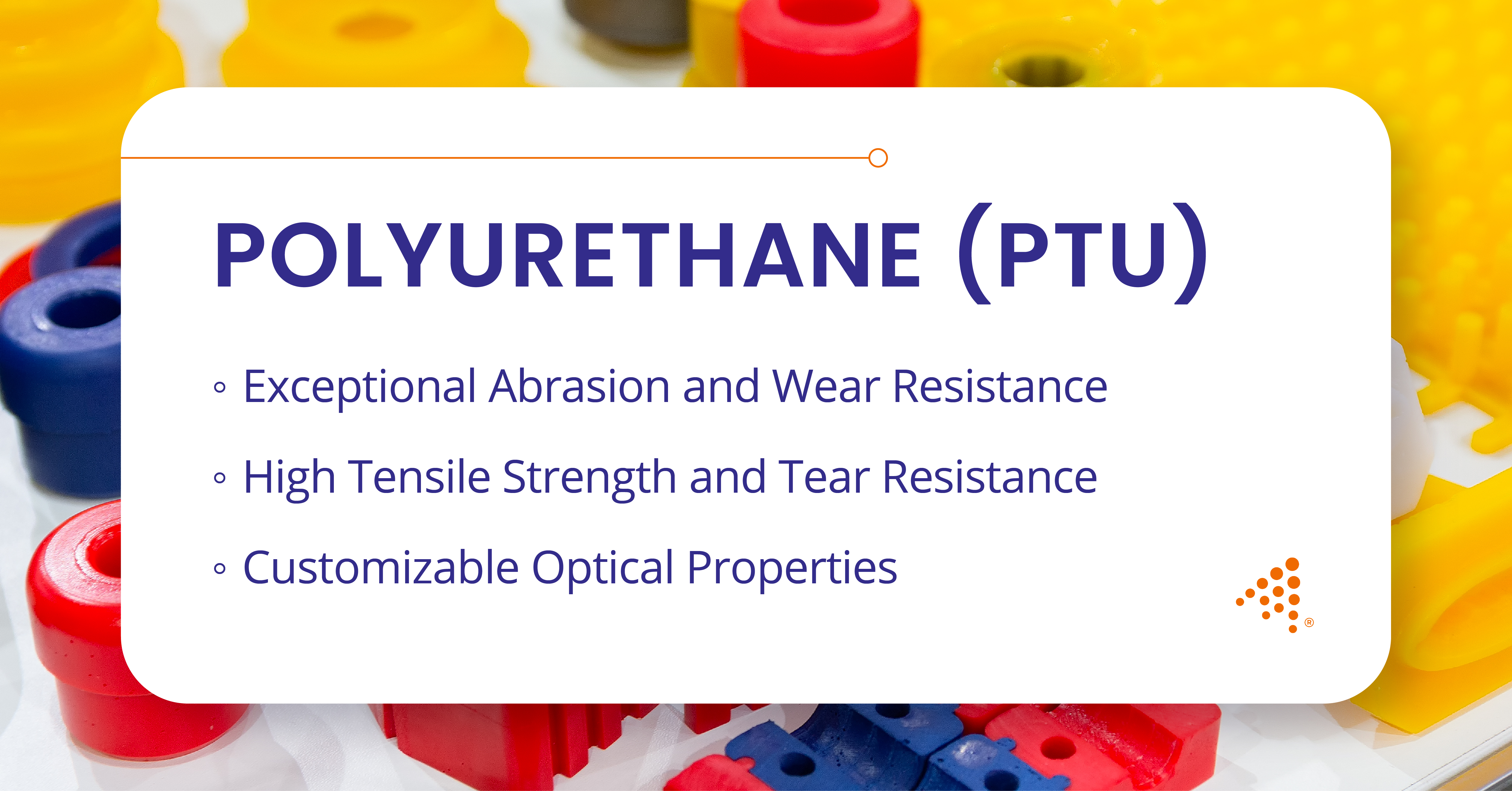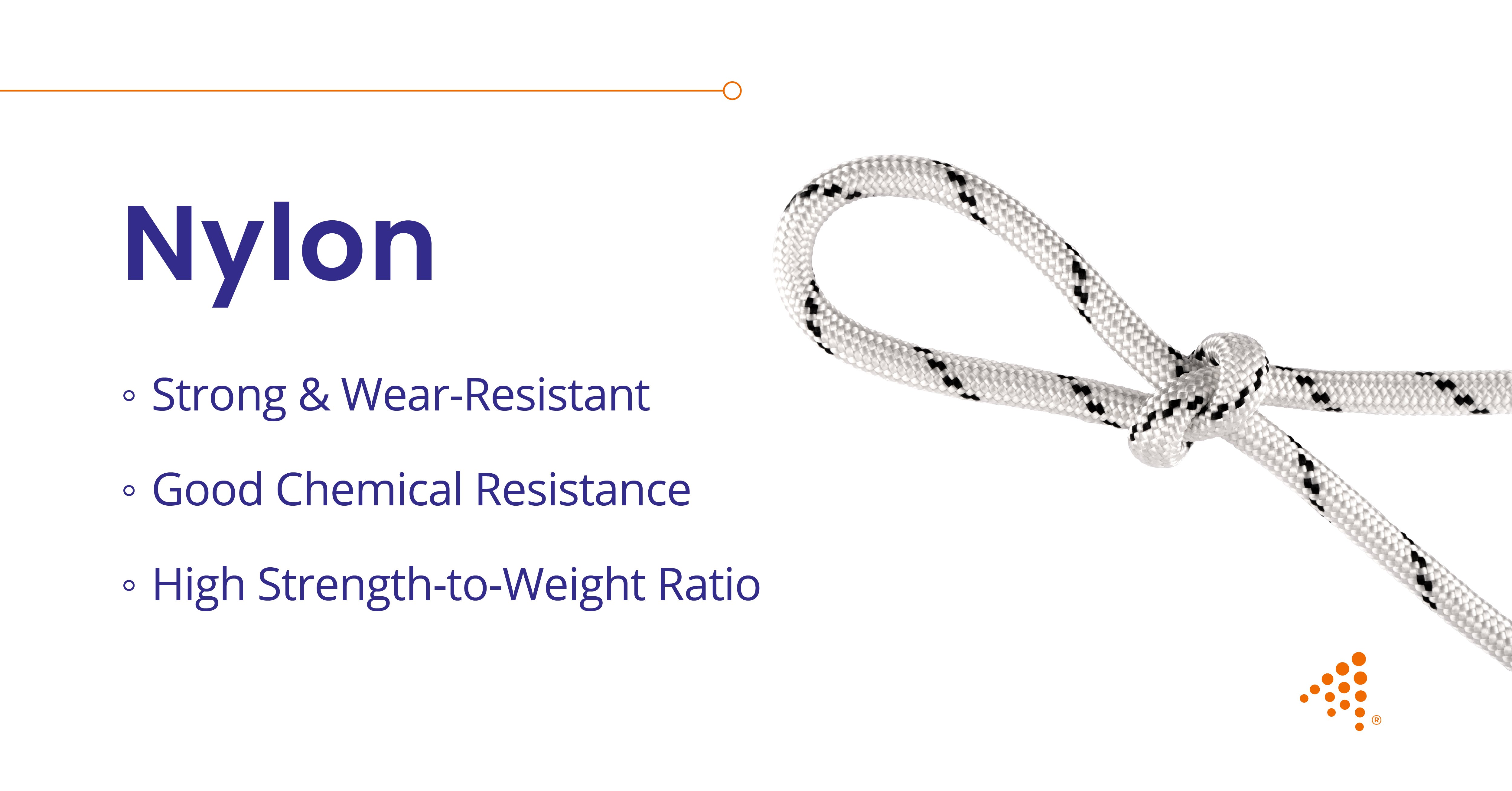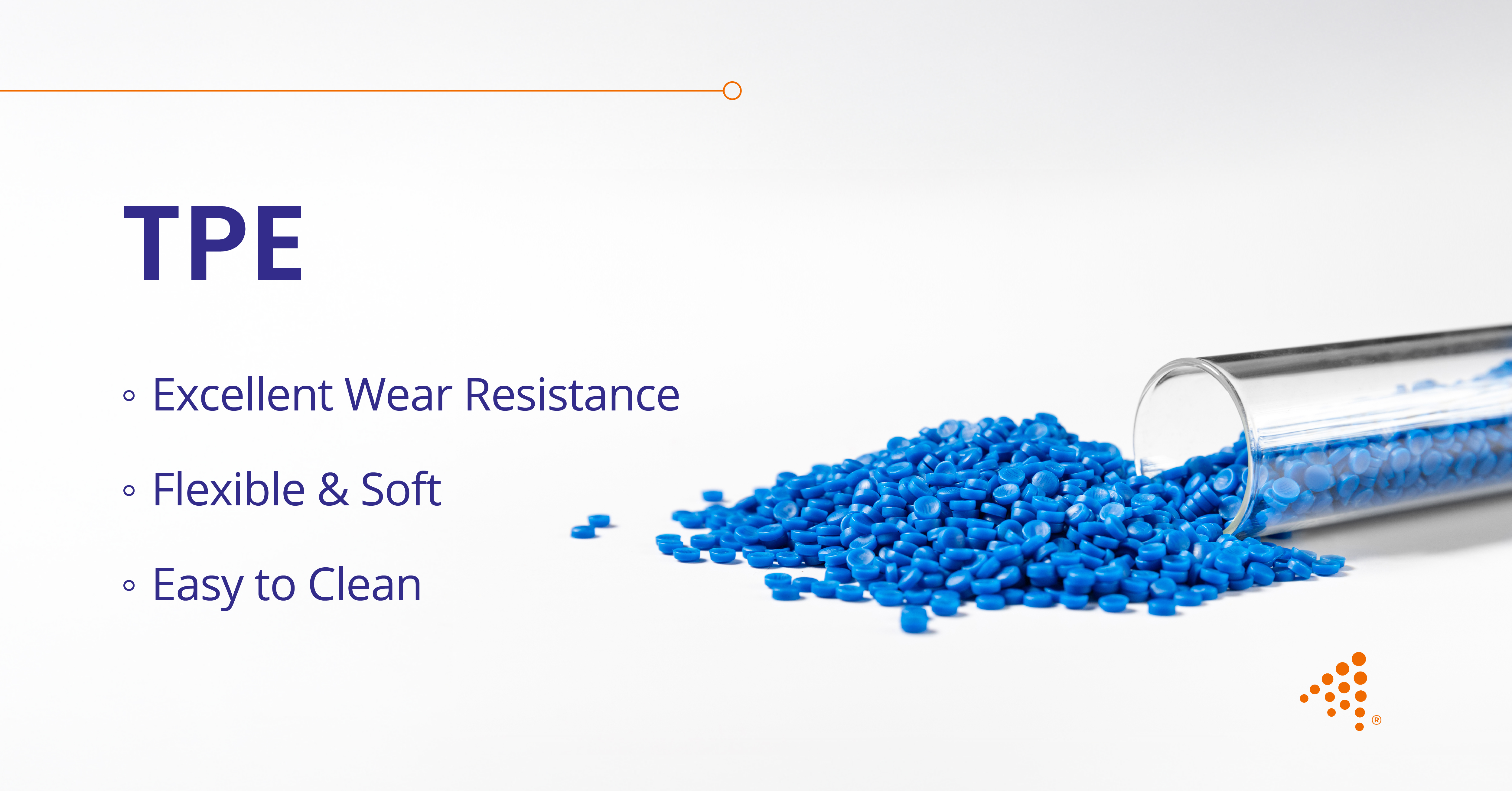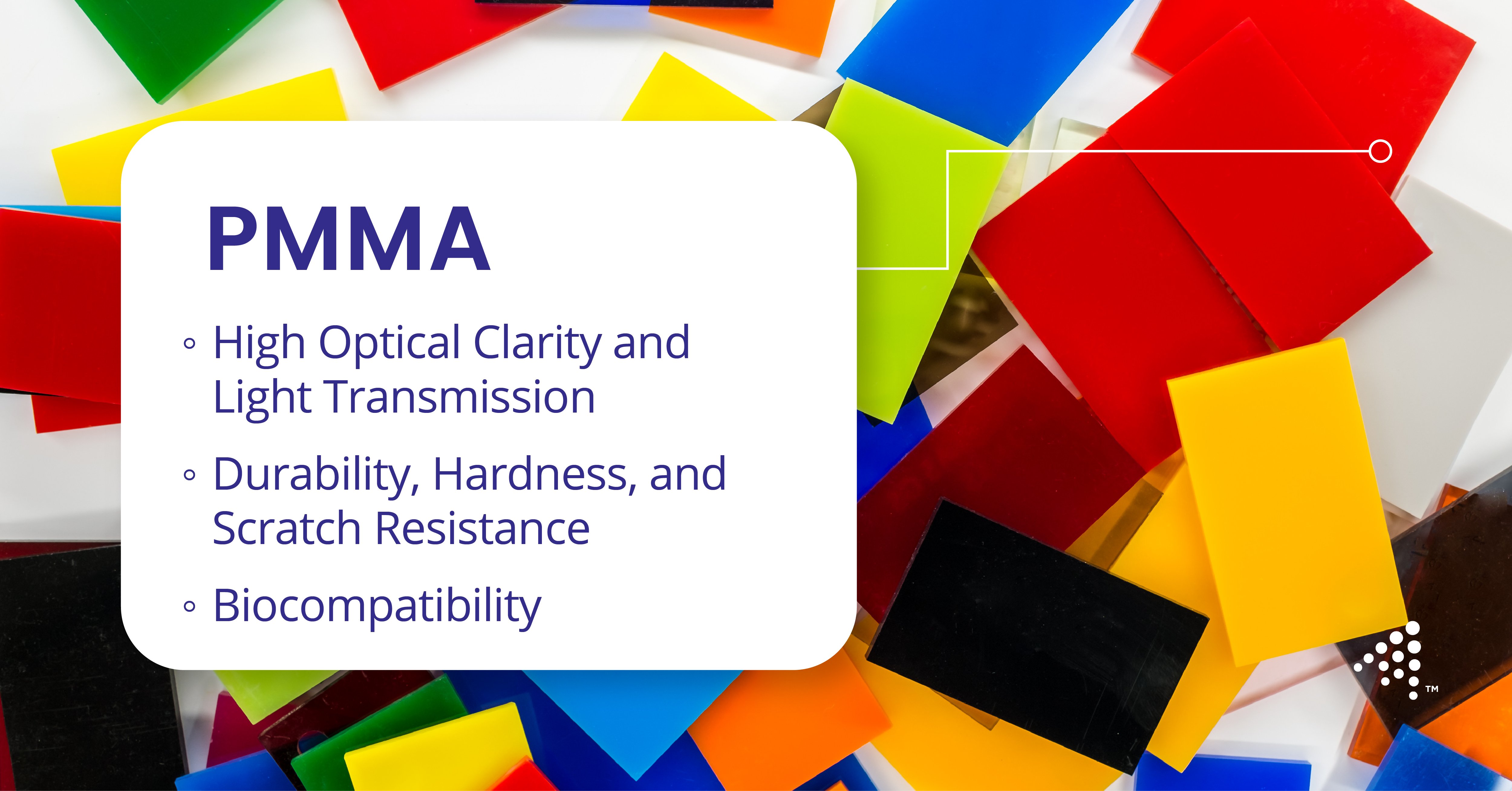Nylon (Polyamide): Durable and Versatile for Many Applications
Nylon (Polyamide): A Tough, Durable Resin for a Variety of Uses
6 min read
Nick Erickson : Aug 25, 2025 8:49:00 AM

Polyurethane (PTU) is a uniquely versatile class of polymers that exists in a variety of forms, from flexible and rigid foams to durable elastomers and high-performance coatings. This adaptability stems from its distinctive chemistry, which allows for a wide range of properties to be engineered, making it a crucial material in countless products across diverse sectors, including the demanding field of medical device manufacturing. PTU's ability to be tailored to specific needs, from soft and pliable to tough and impact-resistant, makes it an invaluable option for plastic part design optimization, complex geometries, and specialized functions.
Read More About Guide to Optimal Material Choices for Injection Molding
PTU's wide formulation latitude allows for an extensive array of material properties, making it a go-to choice for designers and engineers.
One of the most notable attributes of many PTU formulations, particularly thermoplastic polyurethanes, is their outstanding resistance to abrasion, wear, and tear. This makes them suitable for custom injection molding solutions that demand longevity and friction tolerance, ensuring longevity and reliability. In high-stress environments, PTU parts maintain their integrity and surface quality longer than many other polymers.
PTU elastomers are renowned for their impressive tensile strength and tear resistance. They can withstand significant stretching and pulling forces without rupturing, making them ideal for parts that need to be both strong and flexible. This toughness is critical in dynamic uses where materials are subjected to repeated stress.
PTU can be formulated to achieve a vast spectrum of hardness levels, from very soft and gel-like (around Shore 20A) to extremely rigid (up to Shore 85D or higher). This versatility allows engineers to select a PTU grade that precisely matches the durometer requirements of their specific part, whether it's a soft-touch grip for a medical instrument or a robust housing for electronic equipment.
PTU generally offers good resistance to oils, greases, solvents, and many chemicals. This property is particularly beneficial for components used in industrial settings or medical environments where exposure to various substances is common. However, specific chemical resistance can vary significantly depending on the type of PTU (polyester-based or polyether-based) and the specific chemical in question.
Many PTU grades exhibit superb elasticity, meaning they can be stretched and will return to their original shape. This rubber-like behavior is highly valued in items requiring flexibility and resilience, such as seals, gaskets, tubing, and shock-absorbing elements. Even at lower temperatures, certain PTU formulations maintain good flexibility.
Specific grades of PTU have been developed to meet stringent biocompatibility standards, such as USP Class VI and ISO 10993. This makes them suitable for a variety of medical device prototypes and plastic injection mold design services, including catheters, wound dressings, and implantable components. Medical-grade PTUs are designed to minimize adverse reactions when in contact with bodily tissues and fluids, a crucial factor in medical injection molding.
Even rigid PTU formulations often demonstrate good impact strength, absorbing energy and resisting fracture upon sudden impact. This characteristic is valuable for protective housings, bumpers, and components that might be subjected to accidental drops or collisions.
While many PTUs are naturally opaque or translucent, specific grades can be formulated for good clarity and transparency. This opens up possibilities for see-through components or parts where visual inspection is necessary.
Explore our design for manufacturing solutions and plastic injection mold design services to find the perfect PTU formulation for your application.
The diverse characteristics of PTU lend themselves to a vast array of uses across numerous industries, from consumer goods to highly specialized industrial and medical products.
PTU is extensively utilized in the medical field due to its biocompatibility, flexibility, and sterilizability. Common medical uses include catheters and tubing (cardiovascular, urinary, and general-purpose), wound care products (films and foams that provide a moist healing environment), implantable devices (pacemaker leads, artificial heart components), and various molded parts for diagnostic and surgical equipment. The precision required for these items often relies on advanced injection molding techniques.
In the automotive sector, PTU is used for a multitude of parts. Flexible foams are standard in seating, headrests, and armrests for comfort. Rigid foams provide insulation and sound dampening. Elastomeric PTU is found in bushings, seals, gaskets, and increasingly in exterior parts like bumper fascias and body panels due to its impact resistance and paintability.
The soles of many athletic and casual shoes are made from PTU due to its combination of cushioning, durability, and slip resistance. It allows for lightweight designs that can withstand repeated impact and provide long-lasting wear.
PTU coatings provide durable, abrasion-resistant, and weather-resistant finishes for floors, automotive paints, wood finishes, and industrial equipment. PTU adhesives are known for their strong bonding capabilities across a wide range of substrates, offering flexibility and toughness.
Rigid PTU foam is an exceptionally effective thermal insulating material. It is widely used in refrigerators, freezers, and building construction (roof and wall insulation, insulated panels) to improve energy efficiency.
Solid PTU tires and caster wheels are common in industrial settings, such as for forklifts and material handling carts, because they offer high load-bearing capacity, abrasion resistance, and resistance to oils and chemicals. They provide a good alternative to rubber in demanding conditions.
The elasticity, tear strength, and chemical resistance of PTU make it an ideal material for seals, gaskets, and O-rings in hydraulic and pneumatic systems, as well as in various industrial machinery and consumer appliances.
Beyond footwear, PTU is found in items like skateboard wheels, rollerblade components, and protective gear, where its toughness and impact absorption are highly valued.
Read More About Injection Molding Defects: Discoloration – Why It Happens and How to Avoid It
The inherent versatility of PTU can be further enhanced through the incorporation of various additives and modifications during its formulation or processing, allowing for precise tailoring of properties to meet specific end-use requirements.
Pigments and dyes can be easily incorporated into PTU to achieve a wide spectrum of colors. This is important for branding, aesthetics, and for functional purposes such as color-coding in medical devices or safety equipment.
To modify mechanical properties such as stiffness, strength, or cost, various fillers can be added. Glass fibers, mineral fillers (like talc or calcium carbonate), and even wood flour can be used. Reinforcing fibers, for example, can significantly increase the tensile strength and modulus of PTU components.
For uses requiring fire safety, such as in electronics, construction, or transportation, flame retardant additives can be incorporated into PTU formulations. These additives help the material meet specific flammability standards by inhibiting ignition or reducing the spread of flames.
PTU, particularly aromatic types, can be susceptible to degradation and discoloration upon prolonged exposure to ultraviolet (UV) light. UV stabilizers, such as hindered amine light stabilizers (HALS) and UV absorbers, are added to protect the polymer chains and extend the material's lifespan in outdoor or high UV exposure settings.
While many PTUs are inherently flexible, plasticizers can be added to further increase flexibility, reduce hardness, and improve processing characteristics for certain grades. This is common in producing very soft PTU elastomers or coatings.
For medical devices, food contact surfaces, or other uses where microbial growth is a concern, antimicrobial additives can be incorporated into the PTU. These agents inhibit the growth of bacteria, fungi, and other microorganisms on the material's surface.
In the production of PTU foams, blowing agents are essential. These substances (either chemical or physical) create the cellular structure of the foam. The choice of blowing agent influences the foam's density, insulation properties, and cell structure (open or closed cell).
Polyester-based PTUs can be susceptible to hydrolysis (degradation by moisture, especially at elevated temperatures). Hydrolytic stabilizers, such as carbodiimides, can be added to improve their resistance to this type of degradation, extending their service life in humid environments.
Read More About The Ultimate Guide to ABS for High-Performance Manufacturing
Despite its many advantages, PTU also has certain limitations that engineers and designers must consider.
Compared to some commodity plastics like polyethylene or polypropylene, PTU can be more expensive. Its higher cost is often justified by its superior performance characteristics, but it may not be the most economical choice for all uses, especially those with less demanding requirements.
Aromatic PTUs, which are common due to their strength, can yellow and degrade mechanically when exposed to prolonged UV radiation unless adequately stabilized. For outdoor uses, aliphatic PTUs, which are inherently more UV stable but often more expensive, or well-stabilized aromatic grades are preferred.
Polyester-based PTUs can be susceptible to hydrolytic attack, meaning they can degrade in the presence of moisture, particularly at elevated temperatures or in humid environments. This can lead to a loss of mechanical properties over time. Polyether-based PTUs offer much better hydrolysis resistance and are often chosen for applications involving prolonged water contact or high humidity.
While PTU offers good performance over a broad temperature range, its upper continuous service temperature is generally lower than some high-performance engineering thermoplastics. Exposure to temperatures exceeding its limit, typically around 176-248°F (80-120°C) depending on the grade and loading, can lead to softening and degradation.
From Medical Device Prototypes to Low-Volume Injection Molding, Aprios delivers end-to-end support with precision-engineered tooling solutions and Rapid Prototyping Services.
Choosing PTU for a project is often driven by its unparalleled combination of toughness, flexibility, abrasion resistance, and the ability to be precisely formulated for a specific hardness or biocompatibility requirement. Its capacity to bridge the gap between rubber and plastics makes it a problem-solver for many design challenges. For industries like medical device manufacturing, the availability of medical-grade PTUs that meet stringent biocompatibility and sterilizability requirements is a significant advantage. The material’s adaptability means it can be used to create everything from soft, pliable tubing that is gentle on tissues to robust, impact-resistant housings for sensitive electronics. When a design demands high wear resistance, good elasticity, and reliable performance in challenging environments, PTU often emerges as the material of choice, providing durable and dependable solutions.
Aprios offers complete design for manufacturing solutions, from prototype injection molding to full-scale injection mold design services. Whether you're in healthcare, automotive, or industrial design, our team helps you navigate material selection, tooling, and production with precision.
Contact Aprios today for expert guidance on the right polyurethane material for your application!

Nylon (Polyamide): A Tough, Durable Resin for a Variety of Uses

Thermoplastic elastomer (TPE)/thermoplastic vulcanizate (TPV) combines the benefits of rubber with the processability of thermoplastics, making it an...

Polymethyl Methacrylate (PMMA), commonly known as acrylic or by trade names like Plexiglas® and Lucite®, is a transparent thermoplastic valued for...